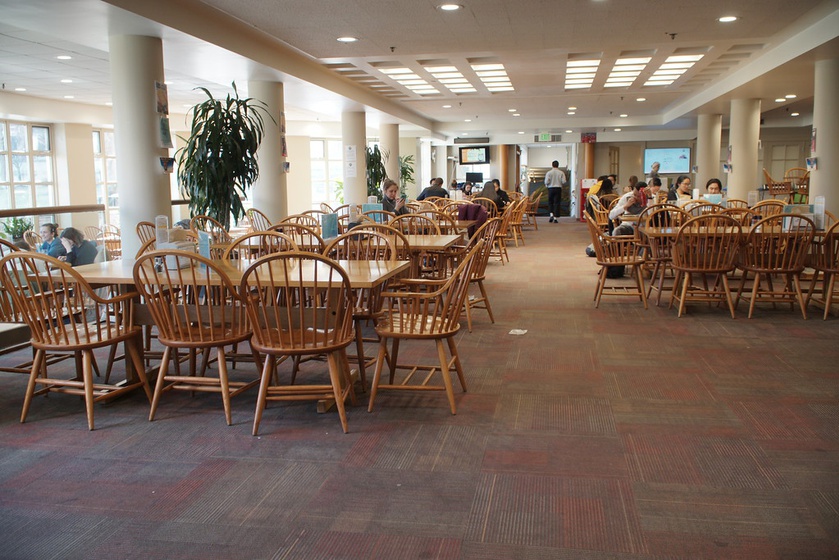{shortcode-2469faddbab3d6d981a201cefea2f1eadf3e1911}
Every Wednesday at 9 a.m., a small group of students attend a seminar in the Cabot House dining hall. Its location isn’t the only thing that makes this seminar out of the ordinary — on the first day of class, rather than sharing answers to icebreakers or listening to a Powerpoint lecture, these students began the semester with a hands-on experience, embarking upon a behind-the-scenes tour of Cabot House led by its staff members.
According to the syllabus, the Quad Lab is an “experimental, practical research seminar” that helps students become “responsible citizens in [the] community” by understanding the “contested, complex, rewarding histories of the places we call ‘home.’” It explores topics including gender, race, class, ethnicity, and labor, particularly in the context of those who are left out of historical narratives. While the seminar is open to all undergraduates, the majority of students live in the Quad.
The seminar’s emphasis on house-based learning and community recalls the now-defunct House Seminars, which were for-credit courses sponsored by individual residential houses. Previous seminars included Leverett 74: “The Worldviews of Sigmund Freud and C.S. Lewis,” and Winthrop 75: “The Laws of War.”
Asked about the legacy of house seminars, Director of Undergraduate Studies in History, Quad Lab Instructor, and Cabot House Faculty Dean Ian J. Miller remarks that his class “is an experiment to see if returning classes to the house environment works.” But while the Quad Lab shares the House Seminars’ connection to a house community, it is a far cry from the old program. The Quad Lab still falls within the history department rather than operating under a house’s supervision, and, of course, focuses on the history of the Quad — there is currently no equivalent class for River houses.
The Quad, located a 15-minute walk from the heart of campus, is a unique space for examining history at Harvard. Hazim Hardeman, a Ph.D. student in American Studies at Harvard and the teaching fellow for the Quad Lab course, says the Quad has historically been a space for marginalized students on campus. “Because of how it’s positioned in relation to the University, and the tropes, the myths, the caricatures, the stereotypes that surround it, all of those things are a real fodder for historical inquiry,” Hardeman says.
Hardeman says that studying the Quad provides access to histories of race, class, and gender at Harvard. In part, this is because of the Quad’s history as the all-female Radcliffe College. After Radcliffe merged with Harvard, most Black students at the University lived in the Quad.
For Hardeman and Miller, the Quad Lab is about approaching the past differently than traditional history courses. This is why the very first day of class, when the students engage with Cabot House staff to explore the space, is so special. “By starting with those people who are oftentimes diminished in our accounts and understandings of what makes a place run,” Hardeman says, “we want to think about history in a different way.”
This different way of thinking can be utilized not only in studying the Quad but also in exploring the history of any house at Harvard, which may indicate the potential for the expansion of similar programs across campus. Miller takes Mather House as an example, suggesting that investigating “the construction of the space” would allow students to study “a 20th-century moment” that is as important as the time periods relevant to Cabot House. Miller believes houses are “the secret sauce of the Harvard College experience,” and expanding a house seminar-like program would take advantage of the diversity that is “central to that special sauce.” Hardeman adds that returning academics to the house setting “breeds a level of intimacy where people feel like the house is not only a site where they live [and] socialize, but it’s also a site of learning.”
The Quad Lab’s affiliation with the History Department navigates around some of the original drawbacks of house seminars. One feature that contributed to the decline of the seminars was their often obscure topics; as Shahram Khoshbin, the professor for Currier 127: “Disorders of the Brain and Behavior” recalls in a 1988 Crimson article: “A few years ago, apparently they had a few seminars that were rather esoteric, which gave the program a bad name.” By affiliating with the history department and narrowing its focus to each house’s past, the program may be able to avoid this pitfall if reinvigorated.
Ultimately, Miller and Hardeman are hopeful for the future of courses at Harvard such as the Quad Lab, and for the unique benefits of teaching history in residential spaces.
For Hardeman, it’s the enthusiasm of the students — many of whom are not history concentrators themselves — that makes the course so rich. “The desire to follow their curiosity, and to be concerned with how we arrive at understandings of place — that’s something that really inspires me.”


